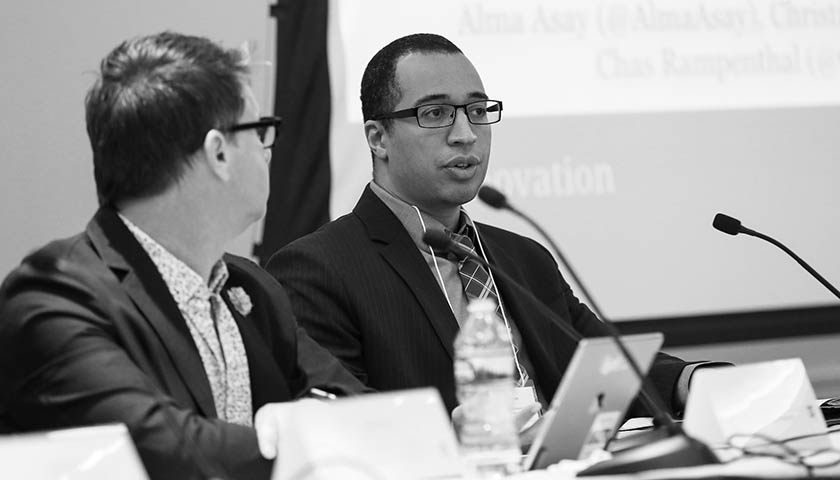A Boston law school is using tech to take on COVID-19 and lessen it impact on the court system.
Suffolk University Law School students and leaders of its Legal Innovation & Technology Lab (LIT Lab) are spearheading an effort to help Massachusetts state courts better serve the public’s legal needs during the pandemic.
The state’s courts are mostly closed to the public as a result of the virus, opening their doors only to address emergency cases. The Suffolk team is calling on coders, lawyers, paralegals — and even people with no subject matter or tech experience — to help in a virtual assembly line to create mobile apps for submitting court forms, said Quinten Steenhuis, a legal technologist and clinical fellow in Suffolk’s LIT Lab. (Pictured above)
The end result will be user-friendly court forms that can be filled in and submitted by people remotely using a mobile phone. A successful effort will put the state among a handful nationally with the ability to offer the public easy-to-use mobile court forms. Volunteers from Tennessee to South Africa already have offered their assistance, many for 10 or 20 hours a week, Steenhuis said.
The call to action was spurred by the Supreme Judicial Court’s Access to Justice Commission COVID-19 Task Force, which is seeking ways to fill cracks in the justice system when court hours and availability are markedly reduced.
Steenhuis said people who ultimately would benefit from the new mobile apps might include a domestic violence victim seeking a restraining order and unable to reach overburdened court administrators or a renter trying to force a landlord to repair a broken sewage pipe.
Volunteers can sign up by visiting the LIT Lab’s coronavirus emergency court form webpage. The immediate goal is to build 30 forms for family and housing law issues in a few weeks, a target that normally would take several months or even years, Steenhuis said.
Many courts have forms that must be printed out, filled in by hand and delivered to a courthouse or scanned and submitted to the court, said Steenhuis. “But many people don’t have a printer or scanner at home, and they don’t have access to a library right now—or a retail store’s computer station. And the forms’ instructions can be confusing, especially for people with no legal training. Those are hurdles a user-friendly form on a phone can help overcome.”
Court administrators are sharing relevant documents with Suffolk’s LIT Lab, which is then assigning tasks based on a volunteer’s skill set. Lawyers, paralegals and students with knowledge about a particular area of the law will provide users with the context they need—right on screen, as you might find in TurboTax.
Techies, user-experience gurus and students in the Law School’s Legal Innovation & Technology concentration have the skills to assist on the technical side. Volunteers with no legal background will test early versions or help translate the form into languages other than English.
“In the U.S., a majority of people face their civil legal emergencies without a lawyer,” said Suffolk Law Dean Andrew Perlman — a problem called the justice gap.
“The need for solutions to help address the justice gap, including simple, user-friendly, digital court forms is acute,” he said. “The state court closures offer a unique moment to galvanize the community around addressing the problem. The LIT Lab students and staff saw a serious need, and they are pulling together to help solve it. I’m thrilled the Law School can be a critical part of that effort.”
The effort has a successful precedent. Last year, Steenhuis built a successful mobile tool for people facing eviction. That tool educates tenants about their rights, helps them file customized court documents that they can print out themselves, and sends text-message reminders about follow-up documents and court dates. The new project won’t be as detailed, at least in its early stages.
The framework for the mobile apps, Docassemble, is open to anyone. That means technologists in other states will have a leg up in creating forms for their courts.


